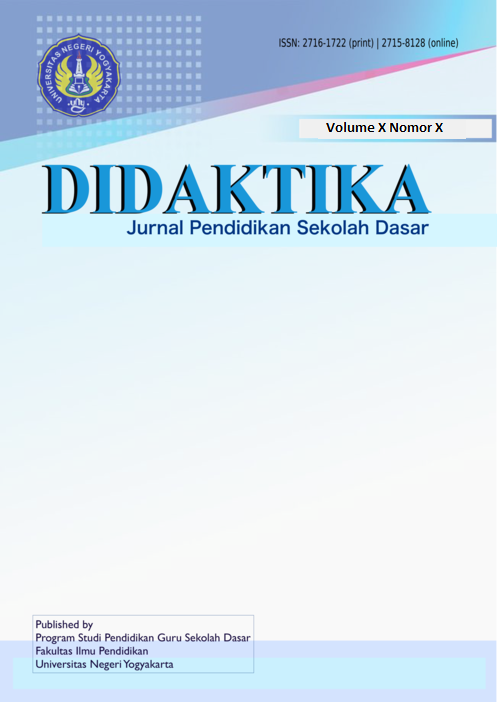Efektifitas Pembelajaran Learning Cycle 5E Terhadap Prestasi Belajar Matematika
DOI:
https://doi.org/10.21831/didaktika.v2i2.28101Abstract
The purpose of this study is to analyze how effective the cycle learning model is towards student mathematics learning achievement by using puzzle mathematics media. This research is an experimental quantitative study carried out in class IV Gondosari Public Elementary School. The design of this research is the static group pretest-posttest desaign. The average mathematics achievement test results were 57.6 for the control class and 67.5 for the experimental class. The prerequisite test shows that the data are normally distributed and homogeneous. The research hypothesis test shows: (1) there is a difference in the average test of learning achievement (knowledge and skills) of mathematics between the experimental class and the control class that is 3,291> 1,997; and (2) puzzle cycle assisted learning cycle cannot meet the classical effectiveness criteria.
References
Abdulwahed, M., & Nagy, Z. K. (2009). Applying Kolb's experiential learning cycle for laboratory education. Journal of Engineering Education, 98(3), 283–294.
Creswell, J. W. (2009). Research Design: Qualitative, Quantitative, and Mixed Methods Approaches (3rd ed.). Los Angeles: SAGE Publications, Inc.
Dixon, N. M. (2017). The organizational learning cycle: How we can learn collectively. Routledge.
Fuadi, R., Johar, R., & Munzir, S. (2016). Peningkatkan kemampuan pemahaman dan penalaran matematis melalui pendekatan kontekstual. Jurnal Didaktik Matematika, 3(1), 47–54.
Gazali, A., Hidayat, A., & Yuliati, L. (2015). Efektivitas Model Siklus Belajar 5E Terhadap Keterampilan Proses Sains dan Kemampuan Berpikir Kritis Siswa. Jurnal Pendidikan Sains, 3(1), 10–16.
Juwadi, I. (2013). Penerapan Media Permainan Puzzle Untuk Meningkatkan Hasil Belajar Matematika Pada Anak Tunagrahita Ringankelas I Di SLB/C TPA JEMBER. Jurnal Pendidikan Khusus, 1(1).
Lestari, K. E., & Yudhanegara, M. R. (2015). Penelitian pendidikan matematika. Bandung: PT Refika Aditama.
Marek, E. A., & Cavallo, A. M. L. (1997). The learning cycle: Elementary school science and beyond. ERIC.
Prananto, I. W. (2018). Media Pembelajaran Tematik Berbasis Macromedia Flash 8 yang Berkualitas. Prosiding Seminar Nasional: "Penguatan Pendidikan Karakter Pada Siswa Dalam Menghadapi Tantangan Global" Kudus, 11 April 2018, 203–207. Kudus: Universitas Muria Kudus.
Salim Nahdi, D. (2015). Meningkatkan Kemampuan Berpikir Kritis dan Penalaran Matematis Siswa Melalui Model Brain Based Learning. Jurnal Cakrawala Pendas, 1(1).
Samsudi. (2009). Desain Penelitian Pendidikan (2nd ed.). Semarang: Universitas Negeri Semarang Press.
Sugiyono, M. P. P. (2007). Pendekatan Kuantitatif. Kualitatif, Dan R&D, Bandung: Alfabeta.
Umar, W. (2012). Membangun kemampuan komunikasi matematis dalam pembelajaran matematika. Infinity Journal, 1(1), 1–9.
Vince, R. (1998). Behind and beyond Kolb's learning cycle. Journal of Management Education, 22(3), 304–319.
Downloads
Published
How to Cite
Issue
Section
Citation Check
License
- Authors retain copyright and grant the journal right of first publication with the work simultaneously licensed under a Creative Commons Attribution License that allows others to share the work with an acknowledgement of the work's authorship and initial publication in this journal.
- Authors are able to enter into separate, additional contractual arrangements for the non-exclusive distribution of the journal's published version of the work (e.g., post it to an institutional repository or publish it in a book), with an acknowledgement of its initial publication in this journal.
- Authors are permitted and encouraged to post their work online (e.g., in institutional repositories or on their website) prior to and during the submission process, as it can lead to productive exchanges, as well as earlier and greater citation of published work.






